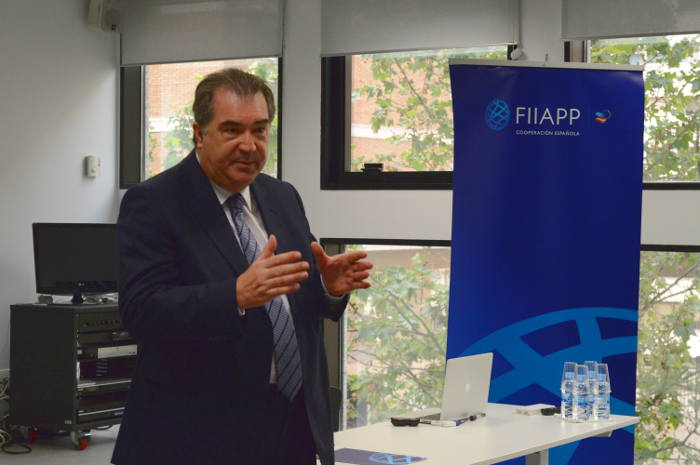-
30 June 2016
Category : Interview
‘Peer-to-peer treatment is very important for ensuring that they continue to trust us’
El Director de Relaciones Internacionales del Colegio de Registradores nos habla de las oportunidades de colaboración con la FIIAPP y del potencial de la cooperación con América Latina
 Fernando Pedro Méndez González, Director de Relaciones Internacionales del Colegio de Registradores de España
Fernando Pedro Méndez González, Director de Relaciones Internacionales del Colegio de Registradores de EspañaWithin the framework of a monographic training course held at FIIAPP’s offices in Madrid, Fernando Pedro Méndez González, Director of International Relations, answers our questions about the function of Spain’s Association of Land Registrars at the international level. We talk about the contributions of the Association in countries like Cuba and Colombia, and about opportunities for working with the rest of the region.
Why is the international cooperation of the Association of Land Registrars with the countries of Latin America important?
One of the conditions for any country to join the European Union is a solid legal system. Why is this so important? Because a good legal system guarantees that the property rights that exist in a country can be exercised, for example, in the case of guaranteeing mortgage loans; and this means there are resources for initiating business or professional activities.
But this cannot be done if deeds are not clear and easily transferable. And this, in an environment of impersonal contracting in a world made up of millions of people, is very difficult and requires very specific and sophisticated technology, and land registries have this. If registries develop themselves, the property market develops. All of this has, therefore, an enormous impact on a country’s economic development.
What are the strengths of the Spanish Association of Land Registrars?
Our main asset is our reputation. The prestige of the Spanish land registration system and of the Association of Land Registrars is very high. That is the fundamental reason that institutions from other countries come to us.
Not so much because our land registration systems are similar, as in the case of Cuba or Puerto Rico, but because they believe that we can offer them innovations, etc.
Moreover, we are going to other countries in an absolutely respectful manner. In other words, we aren’t going there to impose anything. We are going to answer the questions they put to us or to make suggestions we feel are opportune in light of what we are seeing. And I think that this peer-to-peer approach, to put it thusly, is very important for them to continue to trust us.
In what areas could an association like yours collaborate with a foundation like FIIAPP?
FIIAPP is an excellent rara avis because it is dedicated precisely to institutional strengthening and manages considerable funds to this end; and the goal of the Association of Land Registrars is, precisely, institutional strengthening in the area of the land register, the mercantile register, the immovable property register, and tax issues related to these registries, which constitutes a basic institutional aspect.
Therefore, we are two institutions called on to understand each other and to collaborate as intensely as possible.
What can the Association offer in Cuba?
In the case of Cuba, we have been cooperating for some time on the theme of liberalisation of property ownership in the country, and right now we are working on the development of its registration system in three areas: training of human capital, technology transfer, and legislative advising. Always to the extent that they request.
There is a convention signed with the Cuban government that is currently pending implementation. And we want to develop it in coming weeks.
The first thing to be developed is the training of human capital with a course for some 25 Cuban registrars, who are already working to become familiar with the technologies we are using. So that they can see how the Spanish registries work and the benefits that can be obtained from a register, so that, if they consider it interesting, they can put it into practice there.
And in the case of Colombia?
The case of Colombia, everything depends on the post-conflict scenario. Let’s say there is a great deal of energy that is currently waiting, in effect, for the post-conflict scenario to emerge.
And, here, we are working on a policy on accessible housing. We want to collaborate because they have asked us to, in relation to the degree that development of property registration might contribute to the regularisation of landholdings altered as a consequence of so many years of conflict.
The views and opinions expressed in this blog are the sole responsibility of the person who write them.






